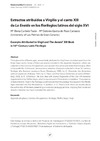Identificador persistente para citar o vincular este elemento:
https://accedacris.ulpgc.es/jspui/handle/10553/77838
| Campo DC | Valor | idioma |
|---|---|---|
| dc.contributor.author | Curbelo Tavío, María Elena | en_US |
| dc.contributor.author | García De Paso Carrasco, M Dolores | en_US |
| dc.date.accessioned | 2021-02-24T14:55:28Z | - |
| dc.date.available | 2021-02-24T14:55:28Z | - |
| dc.date.issued | 2020 | en_US |
| dc.identifier.issn | 1803-7402 | en_US |
| dc.identifier.other | Scopus | - |
| dc.identifier.uri | https://accedacris.ulpgc.es/handle/10553/77838 | - |
| dc.description.abstract | Throughout the different ages, several texts attributed to Virgil have circulated apart from his three major works. Some of them are poems included in the Appendix Vergiliana; others are collected in the Carmina XII sapientum; and we even find some anecdotes that Donatus offers in the poet’s life. In this work, we examine a selection of extracts collected in three 16th-century florilegia: the Illustrium poetarum flores (Strasbourg 1538), by O. Mirandula; the Sententiae ueterum poetarum (Antwerp 1541), by G. Maior; and the Versus Sententiosi et eximii (Wittenberg 1565), by B. Schönborn. We also deal with several fragments of the Libri XIII Aeneidos Supplementum by Maffeo Vegio, which is reproduced in Mirandola’s compilation. The presence of texts linked to Virgil in the florilegia could indicate that the prestige he enjoyed in the Middle Ages extended into the Renaissance. In addition, in G. Maior’s work there are doubts about the authorship of the texts presenting a moral and pedagogical tone, implying that moral and didactic interests may have motivated the selection. | en_US |
| dc.language | spa | en_US |
| dc.relation | Proyecto Excerpta. Un Producto Digital Para la Valorización de Los Libros de Sentencias y El Estudio de Su Contribución A la Cultura Común Europea | en_US |
| dc.relation | FFI2015-69200-REDT | en_US |
| dc.relation.ispartof | Graeco-Latina Brunensia | en_US |
| dc.source | Graeco-Latina Brunensia [ISSN 1803-7402], v. 25 (2), p. 47-60, (Enero 2020) | en_US |
| dc.subject | 6202 Teoría, análisis y crítica literarias | en_US |
| dc.subject | 5702 Lingüística diacrónica | en_US |
| dc.subject.other | Appendix Vergiliana | en_US |
| dc.subject.other | Carmina XII Sapientum | en_US |
| dc.subject.other | Florilegia | en_US |
| dc.subject.other | Maffeo Vegio | en_US |
| dc.subject.other | Virgil | en_US |
| dc.title | Extractos atribuidos a Virgilio y el canto XIII de La Eneida en los florilegios latinos del siglo XVI | en_US |
| dc.title.alternative | Excerpts attributed to virgil and the Aeneid’ XIII book in 16th-century Latin Florilegia | en_US |
| dc.type | info:eu-repo/semantics/article | en_US |
| dc.type | Article | en_US |
| dc.identifier.doi | 10.5817/GLB2020-2-4 | en_US |
| dc.identifier.scopus | 85100654078 | - |
| dc.contributor.authorscopusid | 57208683260 | - |
| dc.contributor.authorscopusid | 26038051300 | - |
| dc.identifier.eissn | 2336-4424 | - |
| dc.description.lastpage | 60 | en_US |
| dc.identifier.issue | 2 | - |
| dc.description.firstpage | 47 | en_US |
| dc.relation.volume | 25 | en_US |
| dc.investigacion | Artes y Humanidades | en_US |
| dc.type2 | Artículo | en_US |
| dc.utils.revision | Sí | en_US |
| dc.date.coverdate | Enero 2021 | en_US |
| dc.identifier.ulpgc | Sí | en_US |
| dc.contributor.buulpgc | BU-HUM | en_US |
| dc.description.sjr | 0,15 | |
| dc.description.sjrq | Q1 | |
| dc.description.erihplus | ERIH PLUS | |
| item.fulltext | Con texto completo | - |
| item.grantfulltext | open | - |
| crisitem.project.principalinvestigator | Rodríguez Herrera, Gregorio | - |
| crisitem.author.dept | GIR IATEXT: Filología Clásica "Juan de Iriarte" | - |
| crisitem.author.dept | IU de Análisis y Aplicaciones Textuales | - |
| crisitem.author.dept | Departamento de Filología Hispánica, Clásica y de Estudios Árabes y Orientales | - |
| crisitem.author.dept | GIR IATEXT: Filología Clásica "Juan de Iriarte" | - |
| crisitem.author.dept | IU de Análisis y Aplicaciones Textuales | - |
| crisitem.author.orcid | 0000-0002-6474-3212 | - |
| crisitem.author.orcid | 0000-0001-7705-112X | - |
| crisitem.author.parentorg | IU de Análisis y Aplicaciones Textuales | - |
| crisitem.author.parentorg | IU de Análisis y Aplicaciones Textuales | - |
| crisitem.author.fullName | Curbelo Tavío, María Elena | - |
| crisitem.author.fullName | García De Paso Carrasco,M Dolores | - |
| Colección: | Artículos | |
Citas SCOPUSTM
1
actualizado el 08-jun-2025
Visitas
112
actualizado el 11-ene-2026
Descargas
59
actualizado el 11-ene-2026
Google ScholarTM
Verifica
Altmetric
Comparte
Exporta metadatos
Los elementos en ULPGC accedaCRIS están protegidos por derechos de autor con todos los derechos reservados, a menos que se indique lo contrario.
